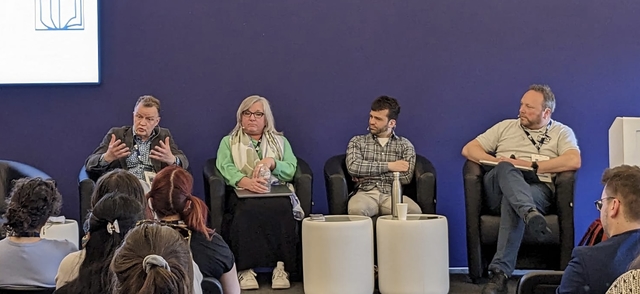The UK-based Publishing Accessibility Action Group (PAAG) is made up of members from the UK publishers association and is designed to be a supportive group that is designed to foster collaboration and encourage companies and publishing professionals in their accessibility journey.
The PAAG charter has ten straightforward points that organisations can commit to either as a publisher or as an ally. Richard Orme (DAISY), Simon Mellon (PRH UK), Martin Klopstock (Kogan Page), and the co-chair of IPA’s Accessibility sub-committee, Laura Brady, spoke. The PAAG charter is meant to be a complement to the Accessible Books Consortium’s charter.
Richard Orme spoke about the structural work that can set a publisher or publisher-support organization for success such as company wide training designed to raise awareness of accessibility issues in book publishing. It’s also helpful for companies to nominal an accessibility champion — someone who can bring together stakeholders, be the point of contact of accessibility questions and research, and who would keep up-to-date on this dynamic, ever-changing space.
Simon Mellon’s talk focussed on the importance of an accessibility policy on a publisher’s website. This signals to authors, consumers, and staff that you are a committed, conscientious and inclusive organization in addition to making it easier for anyone to find out about a publisher’s policies and how to get help. Posting an accessibility policy is also a requirement of the European Accessibility Act. How does one write an accessibility policy. The PAAG website had resources for creating your statement.
A critical part of the accessibility policy is establishing a point of contact; this is a legal requirement in some areas as well. Establishing a response workflow is a necessary step and will help various in-house staff to find answers quickly in addition to forcing them to keep up with changing technology around accessibility.
Laura Brady spoke to the question of meeting standards, finding support for that work, and advocating for change in the supply chain. The work standards often causes fear, confusion, or ambivalence, but think of standards like the Web Content Accessibility Guidelines (WCAG) and EPUB Accessibility 1.1 as guidelines to nudge publisher to be more thoughtful and organized about their digital publishing program. What this means in the context of ebooks is this:
- Structure and hierarchy — robust navigation including a print-corollary page list
- Fully accessible and described media
- Optimized for assistive tech with language shifts
- Pay attention to accessible design principles — colour contrast, display transformability
- Describing that work accurately in the metadata
She noted that publishers might consider pursuing Benetech’s Global Certified Accessible designation. The GCA process is an education as well as a business booster. The process is iterative which makes it an education in and of itself which helps publishers work out the kinks in their workflow with actionable fixes including code snippets. The accessibility checker tool, Ace by DAISY, is another way to find support for a publishers accessibility work.
According to Brady ‘working in accessible publishing is 50% doing, and 50% bugging people’. Advocating for change in the industry and in the book supply chain is an essential part of this space. Accessibility metadata, for example, is a useful and robust way to describe any features and pitfalls of a given piece of content. There are three kinds of accessibility metadata: Onix codelist 196 that travels alongside digital content, the schema.org metadata that goes right in the EPUB, and conformance metadata. But at present accessibility metadata is not well-supported in the supply chain. In fact, most title management systems (sometimes known as metadata aggregators) don’t have a full set of the ONIX descriptors, and haven’t the foggiest what to do with the descriptors in an ebook. There are very smart people working on this issues at the standards, publisher, and retails levels but your voice asking for change could be super valuable.
Finally, Martin Klopstock talked about the importance of accessibility metadata. If you are going to do the work to publish inclusively, then be sure to crow about that work in the descriptors that you send out into the supply chain about your books. Use Onix codelist 196 values in the metadata that travels alongside a book. Embed schema.org metadata right in and ebook. If you have an accessibility certification, be sure to list that in the conformance metadata. Don’t skip over an accessibility summary that describes both the features and the pitfalls of an ebook. Vital Source and Red Shelf are both vendors exposing accessibility metadata making either a good place to see this in action. See this Kogan Page listing, for example.
There is a PAAG LinkedIn Group where questions, events, and news about the accessible publishing space is discussed. Consider signing the PAAG charter and joining in the conversation about inclusive publishing.
Thanks to Laura Brady for this report.

